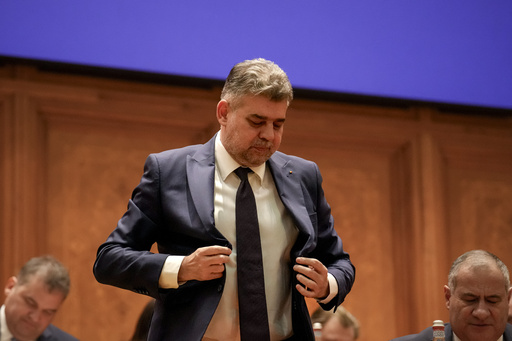BUCHAREST, Romania — On Monday, Romanian lawmakers narrowly approved a new pro-European coalition government under the leadership of current Prime Minister Marcel Ciolacu. This decision may signal the end of a prolonged political crisis within the European Union member state, following a top court’s annulment of the recent presidential election. The parliamentary vote concluded with a count of 240 in favor and 143 against, in a legislature comprised of 466 seats.
The coalition includes the left-leaning Social Democratic Party (PSD), the center-right National Liberal Party (PNL), the smaller ethnic Hungarian UDMR party, as well as representatives from national minorities. This agreement follows a month marked by political instability, during which far-right nationalists gained significant traction in the Dec. 1 parliamentary election. This shift followed a preliminary presidential race where the far-right candidate Calin Georgescu emerged as a leading contender.
“It will not be an easy term for the upcoming government,” remarked Ciolacu, whose PSD party received the highest number of votes in the parliamentary elections, in a statement released on Monday. “We understand that we are facing a severe political crisis,” he continued. “This is also a crisis of trust, and our coalition’s goal is to restore citizens’ faith in us.”
The 16 ministerial roles in Romania’s new government will be divided among the coalition parties, which form a slender majority in the legislature. This alliance is perceived as a strategic effort to marginalize far-right nationalists, who gained popularity amidst rising living costs and economic challenges. Despite polls suggesting otherwise, Ciolacu finished third in the initial round of presidential voting and has held the role of prime minister since June 2023.
Following the parliamentary vote, President Klaus Iohannis inaugurated the new government, cautioning that it was embarking on “a challenging new period,” highlighting that “many Romanians are facing serious concerns.” Romania has experienced significant upheaval due to Georgescu’s unexpected success in the presidential elections, further complicated by claims of electoral fraud and allegations of Russian meddling. Just before the Dec. 8 runoff, the Constitutional Court made the unprecedented decision to annul the presidential race altogether.
“We are navigating through complex times, but I believe we have all learned from past errors,” Ciolacu stated. He expressed hopes that with cooperation within the coalition, they could determine the best strategies to overcome upcoming challenges.
Ciolacu also noted that the government’s priority would be to swiftly plan a rerun of the presidential election, with a mutual agreement to present a common pro-European candidate. Political consultant Cristian Andrei, based in Bucharest, suggested that the new cabinet might adopt “soft populist” language, emphasizing themes such as economic patriotism and solutions for peace in neighboring Ukraine, as a countermeasure to the rise of far-right populism.
Andrei elaborated, stating, “This approach may address the concerns of many Romanians who supported populist candidates, but it does not resolve the underlying trust issues.” He added that the effectiveness of the pro-European candidates in responding to this growing sentiment will be critical.
George Simion, leader of the far-right Alliance for the Unity of Romanians, which finished second in the parliamentary election, announced that all lawmakers from his party would oppose Ciolacu’s new government.
In 2021, the PSD and PNL had previously formed a coalition alongside UDMR, but tensions grew, leading to UDMR’s exit from the Cabinet the previous year due to a dispute over power-sharing.
